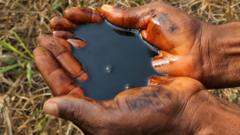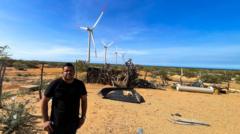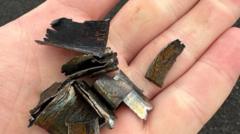The BBC's investigation highlights the serious accusations against Shell regarding the management of an oil remediation program in Ogoniland, Nigeria. Despite Shell's claims of progress in cleanup efforts, evidence suggests that systemic issues and corruption have plagued the operation, leading to ongoing environmental degradation. Communities affected by oil spills, which have persisted for decades, are set to challenge Shell's accountability in a forthcoming civil trial in London.
Shell Overlooks Allegations of Oil Cleanup Corruption in Nigeria

Shell Overlooks Allegations of Oil Cleanup Corruption in Nigeria
A BBC investigation reveals that Shell has ignored multiple warnings regarding corruption and failures in the oil cleanup initiative in Nigeria's Ogoniland, leaving communities to suffer from oil pollution.
In recent findings, the BBC uncovered that Shell has reportedly dismissed numerous warnings related to the alleged mismanagement of a $1 billion cleanup initiative intended to address long-standing oil pollution in southern Nigeria. This project, launched over eight years ago, has been characterized by a whistleblower as a "scam," failing to support the local communities suffering from the consequences of oil spills.
Shell, the largest private oil company operating in Nigeria, alongside the federal government, has consistently advertised the cleanup efforts as successful; however, locals continue to face dire conditions. A significant civil lawsuit is anticipated to commence soon concerning two Ogoniland communities, where inhabitants claim Shell must take responsibility for oil pollution stemming from its infrastructure from 1989 to 2020, leading to public health risks and loss of livelihoods.
Additionally, the investigation revealed internal documents that indicated Shell and government officials were consistently alerted about the problematic operations of the Hydrocarbon Pollution Remediation Project (Hyprep), which is meant to oversee cleanup activities. Allegations included contracts awarded to inexperienced companies and falsified test results that misrepresented the health of the environment.
Displaced locals, such as 50-year-old Paulina Agbekpekpe, shared their harrowing experiences living amidst oil pollution, raising concerns about health ramifications and diminished agricultural prospects. As Shell prepares to divest its Nigerian assets, community leaders expressed fears that the ongoing struggle against pollution and corruption may persist, potentially impacting their futures should local and international entities fail to instate effective oversight. With oil and gas accounting for a significant portion of Nigeria's revenue, calls for accountability and genuine remediation efforts are intensifying, awaiting intervention amidst an already challenged operating landscape.
Shell, the largest private oil company operating in Nigeria, alongside the federal government, has consistently advertised the cleanup efforts as successful; however, locals continue to face dire conditions. A significant civil lawsuit is anticipated to commence soon concerning two Ogoniland communities, where inhabitants claim Shell must take responsibility for oil pollution stemming from its infrastructure from 1989 to 2020, leading to public health risks and loss of livelihoods.
Additionally, the investigation revealed internal documents that indicated Shell and government officials were consistently alerted about the problematic operations of the Hydrocarbon Pollution Remediation Project (Hyprep), which is meant to oversee cleanup activities. Allegations included contracts awarded to inexperienced companies and falsified test results that misrepresented the health of the environment.
Displaced locals, such as 50-year-old Paulina Agbekpekpe, shared their harrowing experiences living amidst oil pollution, raising concerns about health ramifications and diminished agricultural prospects. As Shell prepares to divest its Nigerian assets, community leaders expressed fears that the ongoing struggle against pollution and corruption may persist, potentially impacting their futures should local and international entities fail to instate effective oversight. With oil and gas accounting for a significant portion of Nigeria's revenue, calls for accountability and genuine remediation efforts are intensifying, awaiting intervention amidst an already challenged operating landscape.





















